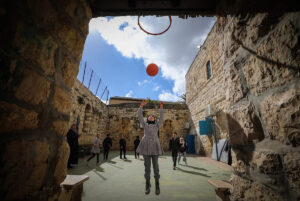Israel claims to care about Palestinian students – so it shuts down their schools

Palestinian students at an UNRWA school in the East Jerusalem neighborhood of Silwan, 30 January 2024
Gil Gertel reports in +972 on 6 May 2025:
On April 8, Israel’s Education Ministry issued closure orders for six UNRWA-operated schools in East Jerusalem, set to take effect on May 7. In response, the Association for Civil Rights in Israel (ACRI) submitted a modest — perhaps too modest — request: delay the orders by two months to allow students to finish the current academic year and graduating seniors to take their matriculation exams.
Two weeks later, the ministry rejected the request. These were not “closure orders” at all, the ministry claimed, and certainly not an effort to displace some 800 Palestinian students just weeks before their final exams. On the contrary, it was all meant to protect the children.
According to the ministry, the closures were part of a routine “licensing process” designed to ensure that the schools meet “appropriate standards regarding safety, health, pedagogy, and other aspects intended to guarantee the students’ well-being.”
The ministry’s legal adviser who signed the letter went even further: “In fact, our position is that your request — to extend the operation of schools functioning without licenses — is what harms the students’ well-being and welfare.” Imagine that: the Israeli Education Ministry rescuing Palestinian students from the clutches of ACRI.
In its response to ACRI, the ministry also maintained that the closure orders were issued “only after it was verified and confirmed that there are alternative placements for all students.” The Jerusalem Municipality, they argued, planned to put the displaced students into official and recognized institutions, with a dedicated budget allocated to assist with transportation and the purchase of textbooks.
But ACRI field researchers heard a different story. Parents reported that schools they approached were already at capacity and that registration for the next school year had long since closed. The only schools that had openings for students displaced by the closures were too expensive for parents who relied on the free education UNRWA provided.
The Education Ministry added that the municipality was working with the Jerusalem Affairs and Heritage Minister to establish new educational facilities in East Jerusalem to address the severe shortage of classrooms. However, they only intend to complete the construction of one school with temporary structures by the start of the next school year — no help to the students who may find themselves without classrooms this month.
